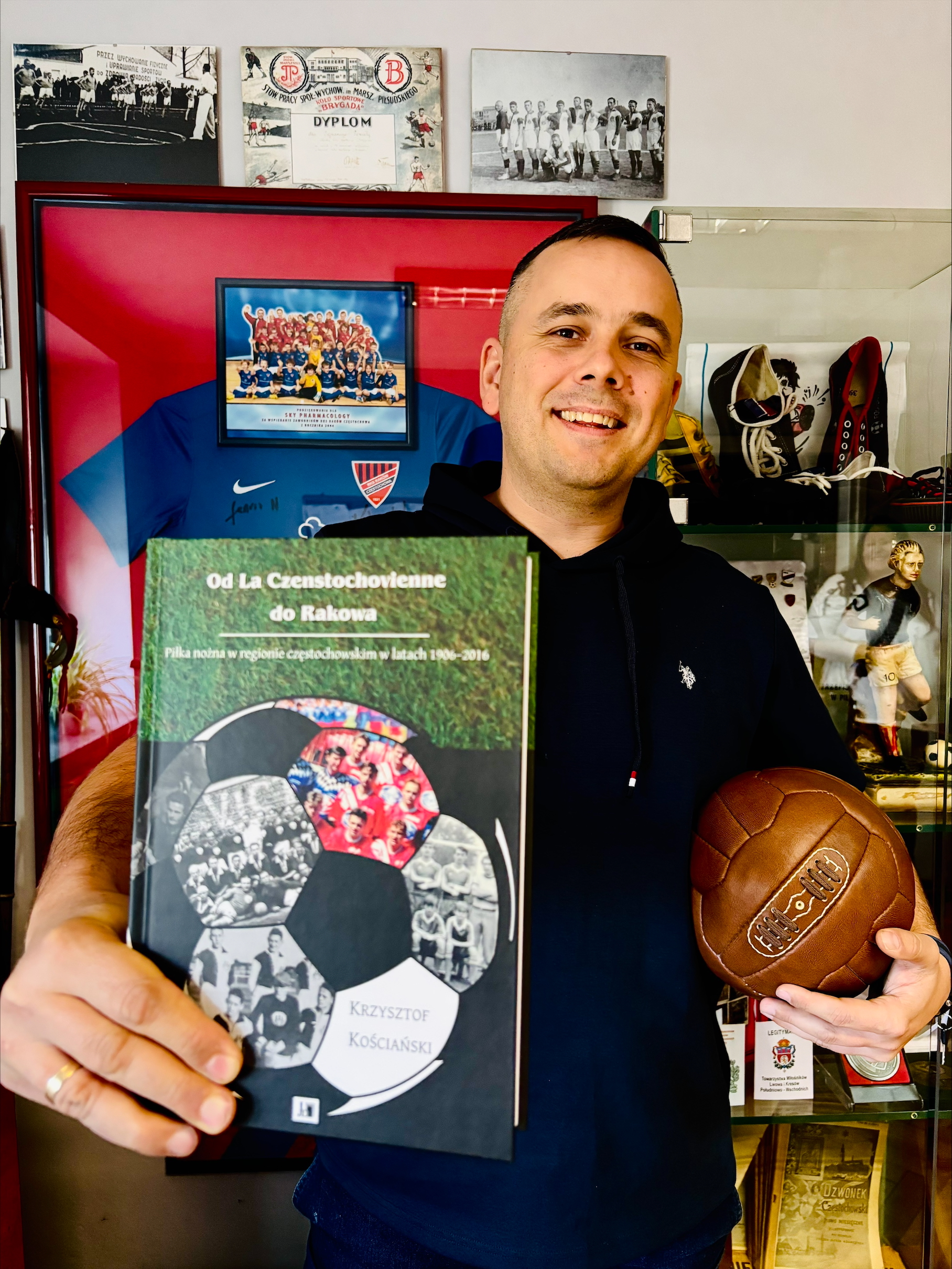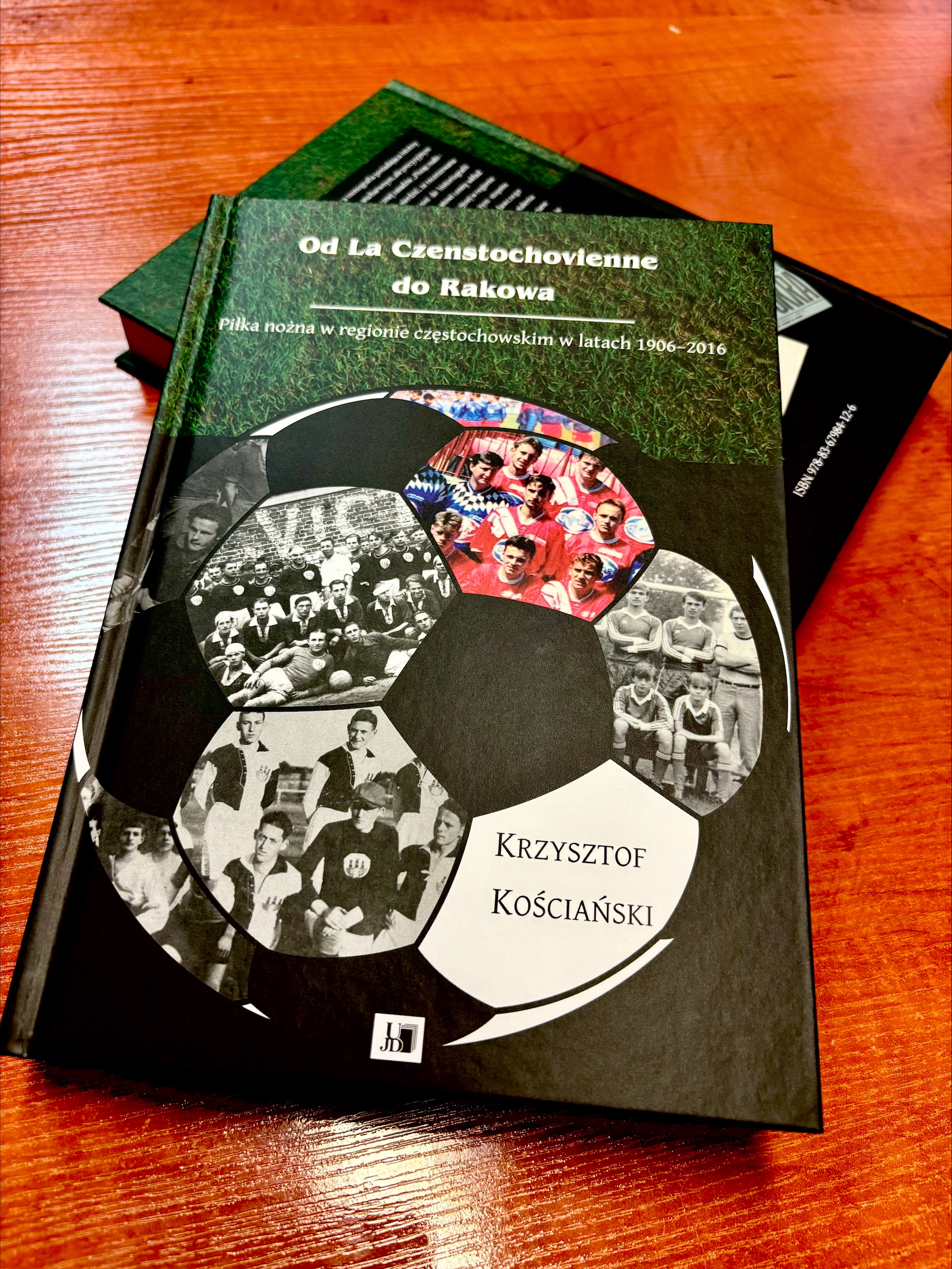ON FOOTBALL HISTORY OVER DECADES
The shelf with books devoted to the Częstochowa region is growing. This time, the book collection has been enriched by a study by dr Krzysztof Kościański entitled "From La Czenstochovienne to Raków. Football in the Częstochowa region in the years 1906-2016". Anyone who thinks that the author limited himself only to preparing a sports chronicle of the region is wrong. On the pages of the study, the reader will find many other threads showing the history of local sport through the prism of changing culture, customs, and even administrative borders. The author even referred to the times before Poland gained independence. What does the author himself say about the book, the first edition of which sold out in 12 hours?
Marek Makowski: How did the idea for a book on sports come about?
Dr Krzysztof Kościański: Colloquially speaking, it resulted from my passion, the source of which is my love for football. My master's thesis was already devoted to the history of football in Częstochowa in the years 1975-1998, i.e. the period when the city was the capital of the voivodeship. It was followed by a doctoral dissertation, in which I deepened the topic. I formulated the title: "Football in the Częstochowa region in the years 1906-2016". I defended my thesis at the University of Szczecin in 2023. The supervisor was an academic of Jan Dlugosz University in Częstochowa, prof. Eligiusz Małolepszy.
MM: Can other cities or regions boast such a study of the topic?
KK: Of course they can. Częstochowa and the region were in this respect a completely "virgin area" and practically untouched. Hence, my publication is a timid attempt to fill this gap. I wanted to show the local sport, the people and the circumstances that accompanied its development. This book is about that.
MM:... The study is the result of tedious library and archival queries, searching for sources and studies...
KK: The sources found in the archives in Częstochowa, Kielce and Katowice turned out to be very helpful. I got a lot of information from the press. Here two titles turned out to be very useful: "Goniec Częstochowski" and "Kurier Częstochowski". In my search, I came across real gems. An example can be a film from 1925 devoted to the Częstochowa club 'Victoria'. The five-minute documentary is a sensation on a national scale. Practically no sports community in Poland can boast of such an old image that is also a record of the past!
MM: In your book, you proved that the football traditions on the Warta River date back to the turn of the 19th and 20th centuries...
KK: Exactly, but interestingly, they are the result of many overlapping processes that led to the development of the discipline and its evolution. Częstochowa (and the region) was a border area. Soldiers stationed in the city and the region, as well as border guard officers, have made a huge contribution to the development of various sports, including football, which is the most popular today. Industry has also become such a stimulus. Workers coming to Częstochowa and also investors wanted to have entertainment. The need for competition has arisen, which gives respite from hard work in factories producing textile products, in mines or other enterprises. By bringing people together, the clubs built a sense of unity and identity at the same time.
MM: What can a reader who decides to read the study expect?
KK: On over 450 pages, apart from the genesis of football in Poland or information about football infrastructure, you will also find data on the education of training staff, and finally data on the players themselves. I published, among others, an index of people related to local football and sports. About a thousand people pass through the study, who could be identified and assigned to specific organisations and events! Certainly, there were more, but time did its job and blurred the news about the achievements of many people. Hence, perhaps many valuable events were omitted or the authors of the sources are wrong. In addition, I made sure to equip the book with a bibliography, tables and classifications of teams with information about the position taken at the end of the competition. Readers will also find photographs, reproductions of posters and documents, of which I have collected much more, but then the book would have to come out in several volumes. It is a valuable material documenting the subject matter in which I moved, which says a lot about sport, but also about changing tastes, fashions or finally administrative and even state borders, in which Częstochowa has been over the decades.
MM: Did our sport stand out from the rest of the country?
KK: I have found many materials emphasizing the specificity of the discipline in the Częstochowa district. To encourage you to read, I will mention only two examples. According to my findings, in 1948 in Częstochowa the first match in Poland under artificial light took place. It was played between Victoria Częstochowa and Czarni Radomsko. Another interesting fact is related to the small Truskolasy. Two captains of the Polish national team come from this town: Jerzy Brzeczek and Jakub Błaszczykowski (the latter, by the way, is a graduate of Jan Dlugosz University in Czestochowa, class 2016 – author's note).
MM: Sport is primarily about people...
KK: Football not only arouses emotions, but also unites the community. Not only has the discipline created many well-known and respected athletes, but also coaches and activists. From the interwar period, the figure of the well-known Alfred Franke can be recalled here. He was remembered not only as a social activist, doctor, but also an activist meritorious for the clubs: "Brygada Częstochowa" or "Victoria Częstochowa". Another important representative associated with sport was Lucjan Wojciechowski, who made a name for himself as a player, coach and activist.
MM: There is a common belief that football is a tough male sport. Do women have their share in the development of the discipline?
KK: Of course they do, and a very big one at that. In our region, such an example is KS "Stradom" Częstochowa. The women's team was founded in 1957. It is also worth mentioning the "Gol" club, as the first team from the Częstochowa region to appear in European cups. It successfully trained and integrated women, while promoting football among women.
MM: It is worth asking about the successes of RKS "Raków" Częstochowa. The period covering the study closes in 2016, i.e. before the greatest achievements of the Club.
KK: Of course, you can't skip "Raków". In many places I inform about the team's achievements, contribution to the development of football at the regional and national level. One of such achievements documented in the publication is the participation of the then third league team in the final of the Polish Cup in 1967. The team lost then two to nil against "Wisła" Kraków. Experts assessed the match as very even, and it was even claimed that Raków was the dominant side. Referring to the history after 2016, they are still waiting to be developed. It will slowly be a whole decade strewn with numerous successes, as well as events that took place for the first time - e.g. participation in European cups. I stopped at April 2016. Then coach Marek Papszun joined the team. This transfer marked the beginning of successes on the national arena and beyond...
MM: How was the book received by readers?
KK: The book hit the market thanks to the publishing house of Jan Dlugosz University in Czestochowa in December 2024. The entire edition was sold out in twelve hours! The second edition is expected to appear at the turn of February and March 2025. It was very well received. Thanks to the publication, people representing various environments contact me. They read, comment, find their loved ones and suggest deepening the topic with new information that I often had no idea about. It's nice that the book is alive and is a topic of conversation.
Marek Makowski: Wishing you further success, thank you for the interview
Dr Krzysztof Kościański: Thank you
The author of the book "From La Czenstochovienne to Raków..." is an academic of the Faculty of Social Sciences of Jan Dlugosz University in Czestochowa (in the Department of Pedagogy).


Date added: 18 February 2025

